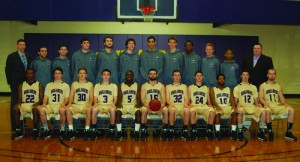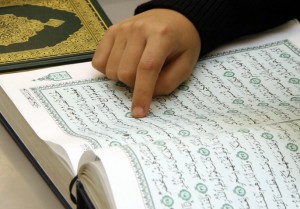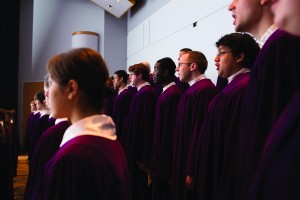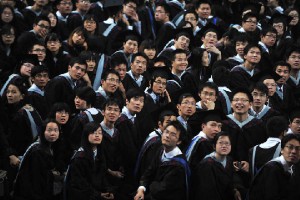This past week brought the Joint Mathematics Meetings (JMM) to Baltimore, Maryland for its annual run in 2014. Spanning four days from January 15th to the 18th, the JMM offers hundreds of talks presented by mathematicians, covering topics ranging from research in pure and applied mathematics to teaching methodology to career options for undergraduates. The conference drew nearly 6500 registered attendees and speakers from across the U.S. as well as from across the world, including three math faculty and nine students from Houghton. Professors Kristin Camenga, Rebekah Yates, and Jun-Koo Park presented original work at the conference, as did junior Samantha Fairchild.
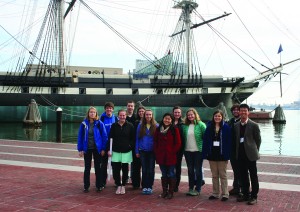 While certain speakers are invited based on their expertise in a field and speaking skills, most submit their own abstracts for review and are approved to present at the conference. “They publish the call for papers with a list of sessions and a description of each of them in late spring or sometime early in the summer and then your titles and abstracts are due in September, early October,” explained Rebekah Yates, assistant professor of mathematics. “Depending on who’s in charge of the session, you find out within a few days or a month whether your talk has been accepted.”
While certain speakers are invited based on their expertise in a field and speaking skills, most submit their own abstracts for review and are approved to present at the conference. “They publish the call for papers with a list of sessions and a description of each of them in late spring or sometime early in the summer and then your titles and abstracts are due in September, early October,” explained Rebekah Yates, assistant professor of mathematics. “Depending on who’s in charge of the session, you find out within a few days or a month whether your talk has been accepted.”
Yates, whose talk was titled “Helping Students Overcome Discouragement in Real Analysis,” presented on her teaching methods in the subject. “It was in the special session on topics and techniques for teaching real analysis,” she explained. Besides presenting to others, Yates also used the conference as an opportunity to receive feedback on her ideas. “You maintain connections that you have and you talk with them about what they’re doing in the classroom and find out what kinds of things are happening at their college and get ideas,” she said. The conference also allowed her to further her professional development by meeting with collaborators for future research.
Math department chair Kristin Camenga’s talk “Developing community norms for proof: forum discussions of the nature and import of proof” also approached mathematics from an educator’s perspective. “I was talking about the forum assignments I use in my Introduction to Proofs class and how one of the goals of that is really to not just learn the mechanics of the proofs but understand why proof is important to mathematics and what it means to be proof,” she said. Like Yates, she also saw the JMM as an opportunity to further both the pedagogical and research aspects of her profession. “I was able to get together with someone I planned to collaborate with and start work on a project, so that’s going to be something that could very well lead to published math papers,” she said.
Meanwhile, assistant professor Jun-Koo Park’s talk, titled “Elastic Model Extensions for Predicting Protein Residue-level Fluctuation,” was included in the conference as part of the contributed paper session on mathematical modeling. It presented original research he began in 2007 as a graduate student at Iowa State University, drawing on his background in biology and mathematics. Still currently in progress, it focuses on “developing a mathematical model for predicting the dynamics of biological structures,” as he explained.
While the majority of the conference is aimed at an audience familiar with higher-level mathematics, various opportunities for undergraduate students are also presented. Recruiters for private and government organizations as well as companies and research programs often attend the meetings, seeking potential hires in well-rounded students.
In junior Samantha Fairchild’s case, the JMM offered her the opportunity to present her summer research. Titled “Rigid Tilings of Quadrants by L-ominoes and Notched Rectangles,” the project was undertaken with other student collaborators during a summer undergraduate research program at Penn State. Although the research had previously been presented at the Shenandoah Mathematics and Statistics Conference in Virginia, presenting in Baltimore allowed her to reach a wider audience. “… [I]t was fascinating seeing all the different projects that [undergraduates] did and realizing how many different areas people can do undergrad research in,” she remarked. However, the highlight of the experience lay elsewhere for Fairchild. “I guess what I was most excited by was that there were actually other girls there,” she explained. “… I was the only girl in my research program.”
Fairchild originally applied to present her research at the JMM after encouragement from Camenga, who saw it as a valuable experience for students wishing to continue with mathematics in graduate school or in a professional setting. Faculty from graduate schools are often judges in the presentations, awarding prizes for poster content and clarity in presentation. “I had a student who presented a poster a few years ago and actually, based on that, decided to apply to a specific graduate school and was known by that graduate school, so he could get in,” Camenga explained. “I think just an awareness of the larger mathematical community and what’s out there in topics that are of interest and having a broader understanding [of them] is another piece,” she added.
Yates echoes this statement. “I think [the JMM] offers a picture of how big the mathematical community is. I know that’s a word that might make Houghton students laugh, but it’s also a word that you might not associate with a discipline,” she said. “We always refer to ourselves as a community in math, but that’s not necessarily something you get to see when you’re just in your small department. …[S]eeing how wide it is and how varied it is is really helpful.”

